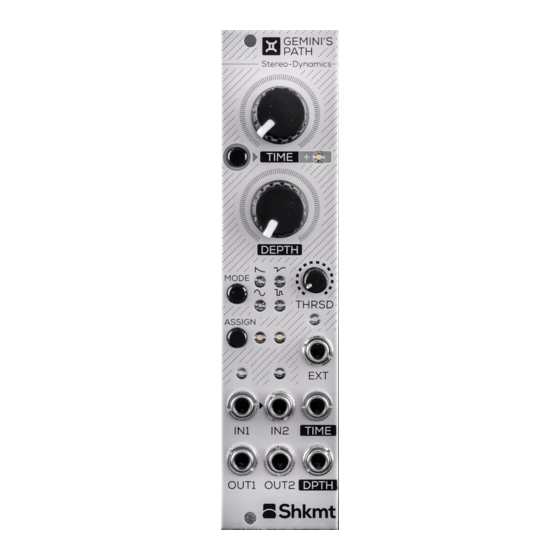Subscribe to Our Youtube Channel
Summary of Contents for Shakmat Gemini’s Path
- Page 1 6HP Eurorack Module Built & designed in Belgium www.shakmat.com Shakmat Gemini’s Path Building Guide...
-
Page 2: Table Of Contents
7.1.1 Push buttons ..................... 9 7.1.2 Jack connectors ..................9 7.1.3 Power header ..................10 7.1.4 Small potentiometer ................10 7.1.5 Big potentiometer ................... 10 IC Plugging ........................11 LED mounting ......................11-12 Nuts and caps ......................... 13 • www.shakmat.com... -
Page 3: Preamble
1. Preamble Thank you for purchasing a Shakmat DIY kit ! We spare no effort in our kit packing process to prevent any mistakes or missing parts. In this document as well, we do our best to describe the assem- bly process in the most practical and comprehensive way. -
Page 4: Pcb Details
3x 6 pin male headers Cutting pliers 4x Amber LEDs Masking tape Pack3 4x 20kΩ resistors 3x Push buttons 3x Push buttons caps 2x Big potentiometers 2x Big potentiometers hex nuts 3x White LEDs 2x M3 screw • www.shakmat.com 03/14... - Page 5 3. PCB details -12V BRAIN SMD PCB Back & front Top PCB Back & front • www.shakmat.com 04/14...
-
Page 6: Smd Pcb Assembly
Take the second PCB from the front side, we’re going to solder two diodes. Be attentive to their orientation, the thick white line on the PCB silkscreen has to match the black line on the component. DEPHT • www.shakmat.com 05/14... -
Page 7: 78L05
All the resistors are mounted perpendicularly to the PCB, so only one of the leg has to be bent. Be careful not to bend too far from the resistor’s body, because this can lead to short-circuits with the aluminium front panel. • www.shakmat.com 06/14... -
Page 8: 3K6Ω Resistor
Save the longest trimmed leg for the next step. 5.1.7 Resistor leg bridge Bend a trimmed resistor leg in a U shape. Pass it through the two holes on the front of the top PCB and solder it on the back side. • www.shakmat.com 07/14... -
Page 9: Pcb Stacking
Then place the female part on the SMD PCB and the male part on the top PCB. Then assemble the two boards toghether and finally once everything is fitted, solder. • www.shakmat.com 08/14... -
Page 10: Complete Top Pcb Assembly
For this connector, you need to cut about three millimeters off the outer ground leg (as shown in the picture above) in order to be able to solder correctly to the adjacent pin header. • www.shakmat.com 09/14... -
Page 11: Power Header
This little stud prevents the front panel DEPHT from sitting properly. Use some sharp cutting pliers for this task. Then, you can place the potentiometers on the board and solder. • www.shakmat.com 10/14... -
Page 12: Ic Plugging
(one on Time potentiometer & one on Out 2) then push the LEDs through their holes until they sit flush with the panel by sticking to the tape. Once everything is in place, you can solder all the LEDs. • www.shakmat.com 11/14... -
Page 13: Led Mounting
LED color goes where. Pay attention not to mix LEDs from different packs, when inactive those clear LEDs are very hard to differenciate from each other. DEPHT Green LEDs ( Amber LEDs ( White LEDs ( LED POLARITY! • www.shakmat.com 12/14... -
Page 14: Nuts And Caps
Place all the push button caps. Tighten the knurled nuts on the jack sockets & hex nuts on the two metal potentiometers. Push the two knobs Jack connector nut (x7) onto their metal potentiometer. Potentiometer nut (x2) Potentiometer knob (x2) • www.shakmat.com 13/14... - Page 15 Turn the potentiometer clockwise, the LED should start to dim. 4- Now, let's test the CV inputs (stay in the same Sine Panning mode), send a positive voltage in the Time input (with the Time potentiometer fully counterclockwise) (...) • www.shakmat.com 14/14...
- Page 16 7- Finally, we test the Time+ button and LED. Pressing the button should light on the LED. If after this debugging you still have problem, don't hesitate to contact us at support@shakmatmodular.com. • www.shakmat.com 11/14...
- Page 17 Product design & engineering : François Gaspard Product & brand design : Steve Hackx...



Need help?
Do you have a question about the Gemini’s Path and is the answer not in the manual?
Questions and answers